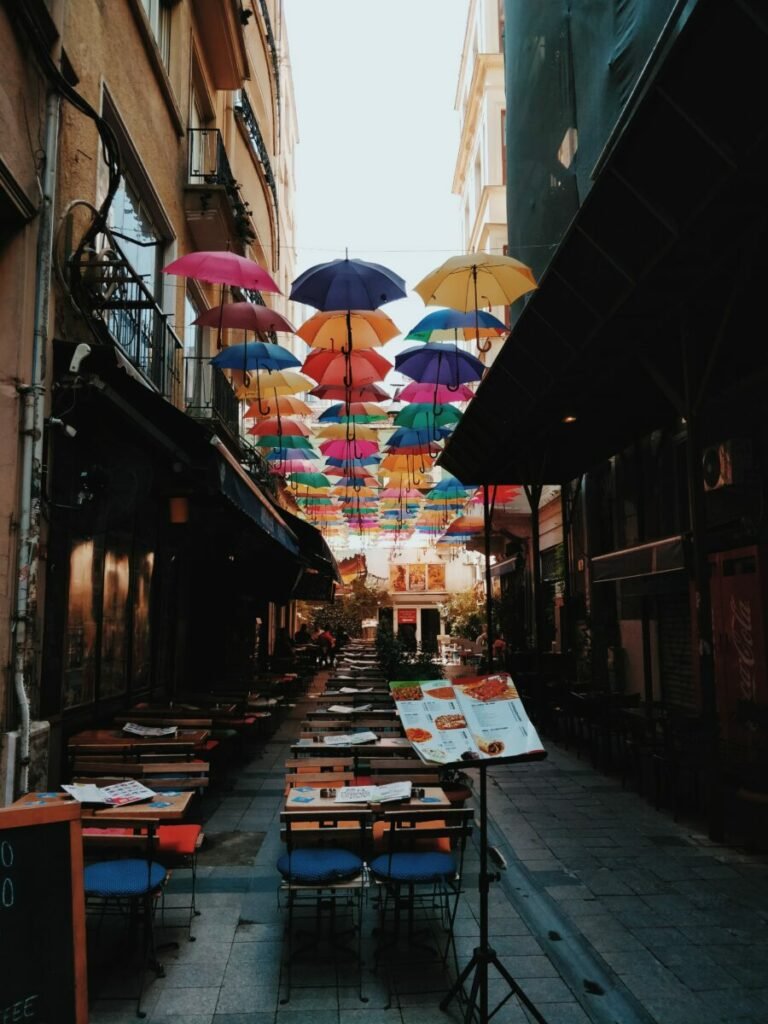
The silence had lengthened to the point where it was awkward. The young man said,
“Have you noticed? Ours is a Cinzano umbrella, but all the others are for Kronenbourg beer.”
Despite herself she turned her shoulders the minimum necessary to ascertain it was true. She thought that if she were in a brighter mood, she might look for some metaphor, but nothing presented itself except the very trivial fact that of the five tables on the terrace of the café, four were shaded by umbrellas advertising Kronenbourg 1664 whereas theirs had on each of its six facets the familiar blue and red diagonal logo of Cinzano vermouth. She then irritated herself by noticing that the molded tin ashtray on their table was painted to sell Gauloises Blonde and irritated herself still further by casting a furtive glance at the ashtray on the next table. She thought, Christ, at this rate I’ll be counting red Citroens versus blue Citroens in the plaza – and betting on the bloody outcome. She said,
“Cinzano’s insipid unless you put gin in it.” Then: “Please leave your lighter on the table. I hate having to keep asking for it, and you know I left mine in the room.”
“Sorry.”
“It’s alright.” She took the lighter, a lighter she had bought for him, a gold Cartier engraved with his name and her name and Happy Birthday in between, and lit one of her own Gauloises Caporal cigarettes. She blew out a long deliberate plume of smoke. She said,
“It’s a pity we weren’t able to see Theresa and David. I know you like them.”
“I thought you didn’t.”
She paused just long enough to give the impression she was considering the structure of her response, not the substance of it. She said,
“I don’t dislike them. They’re just—” She searched for the simile by glancing again at the ashtray on the next table. She found it and turned to face him very brightly, fully aware that he could see himself reflected twice in the lenses of her Dior sun spectacles, immediately above a pair of beautifully shaped and only slightly exaggerated Lancome lips. She said,
“—like Cinzano, darling, but without the gin.”
She smiled. She realized she was still holding the lighter and placed it on the faceted zinc table-top next to the Gauloises Blonde ashtray and exactly between them. He said,
“What the hell—We saw enough of them in Paris.” Then, “I’m starving. How about bread and olives and some of that local cheese? And a bottle of the wine you liked yesterday.” He leaned back over his shoulder. “Garcon!”
She smoothed the tip of her cigarette around the badly damaged face of the cheap tin ashtray, the ashtray advertising the weaker version of the brand she smoked. She thought, I am at the age where being beautiful is offset against the ability to make it work in my favor. She said,
“If you ask them nicely, they’ll put it in a basket for us and we can take it down to the beach.”
“You don’t mind?”
“Why should I mind?”
“Because—” Because yesterday he had suggested the beach and she had wanted to visit that fourteenth century church with the Byzantine-style frescoes, and the day before, when they had gone to the beach, she had worn an enormously wide-brimmed hat and a Balenciaga sort-of kaftan-thing and had spent four hours in the shade with her back to a rock and her knees drawn up to her chin, obscured to the point of childish anonymity. He laughed. He said,
“Why should you?”
He leaned back over his shoulder again, attempting to catch the waiter’s eye, then turned back to face her. His expression was that infuriating (because irresistible) combination of charming helplessness and well-rehearsed charm. He said,
“What’s the word for strawberries? I know they have some—over there—and they’d be nice after the cheese.”
“Fraises.”
“Frez. Frez, frez, frez. Garcon!”
“Monsieur?”
“Fromage et olives et vin blanc, s’il vous plait.” Each word was precise, chiseled in the space between himself and the waiter as surely as the names on the honours board at a private school. “Oh, et le pain, aussi, et peut-etre les fraises?”
“Oui, c’est possible, monsieur. Madame.”
“Merci! Et pour la plage,” he glanced at his companion, “s’il vous plait.”
“Je comprends, monsieur. Madame.”
“Merci!”
He smiled, the young man smiled, a smile of self-satisfaction and relief. He said,
“Let’s have another drink while we’re waiting. Tell you what—I’ll have a glass of that Kronenbourg beer and you can have a Cinzano vermouth and we’ll match these stupid umbrellas. Same as yesterday.”
“Yesterday?”
“Yesterday, you know, the guy renting out the Vespas laughed because your skirt was the exact same colour as your Vespa. And the old woman at the church . . . ”
Her attention wandered to where, at the edge of the terrace, there were steps that led down to the beach. The steps were steep—too steep for many, who preferred to detour a few hundred meters to where a shallower descent led off from the road—but they had the rather beautiful effect of causing the people who used them to either appear or disappear swiftly and almost vertically, rather like elevators or trap doors on a stage. She smiled at the thought. She realigned herself in the lenses of his Ray-Bans. She said,
“A glass of Cinzano under a Cinzano umbrella would be—lovely, darling. Let’s do!”

Share this post with your friends.


